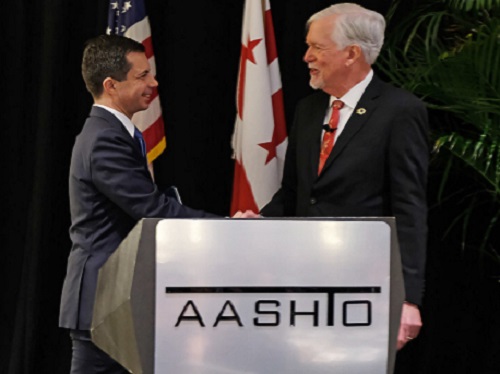The U.S. Department of Transportation recently named two state department of transportation representatives to its Advisory Committee on Transportation Equity or ACTE to help advise the agency on issues related to civil rights and expanding access to jobs and economic opportunities in transportation for all communities.
[Above photo by AASHTO]
The first is Roger Millar (above at right, with USDOT Secretary Pete Buttigieg) – secretary of the Washington State Department of Transportation and president of the American Association of State Highway and Transportation Officials. The second is Tunya Smith, director of Office of Civil Rights for North Carolina Department of Transportation.
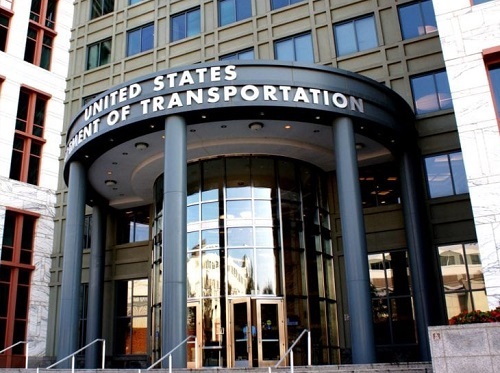
USDOT Secretary Buttigieg said in a statement that he re-established the ACTE – originally formed during the tenure of USDOT Secretary Anthony Foxx – to help USDOT “carry out its mission” to deliver the world’s leading transportation system, serving all American people through the safe, efficient, sustainable, and equitable movement of people and goods.
USDOT noted that its 24-member ACTE will operate in accordance with the provisions of the Federal Advisory Committee Act and will complement the work of the internal USDOT Equity Council, which guides and oversees the process for institutionalizing equity across USDOT’s policies and programs.
The agency noted that appointees to the ACTE are drawn from academia, the private sector, and the transportation industry. They include experts in community engagement, transportation planning, design, research, policy, and advocacy – as well as diversity, equity, inclusion, and accessibility issues. The USDOT noted the ACTE group will hold its first meeting in the fall.
WSDOT’s Millar is a longtime champion of transportation equity, noting in previous comments that equity plays a key role in making transportation systems more “resilient” to both current and future challenges.
“Resilience to me means how we maintain a safe, sound, and smart transportation system – one prepared for a lot more than just climate change,” he pointed out during a presentation in March to AASHTO’s staff.
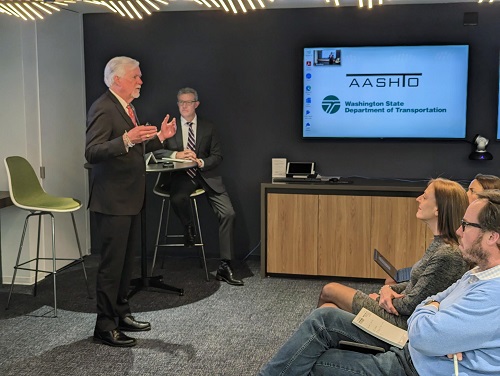
“Transportation has to be ready to handle natural and human caused disasters,” Millar said. “But that also includes demographic and economic changes as well. And we as state DOTs have to be prepared for and adapt to whatever happens.”
For example, state DOTs, in their role as stewards of the transportation system, must address the mobility needs of a “changing and growing population,” Millar said – ensuring that the nation’s transportation system is accessible to everyone.
Addressing that issue involves providing more transportation choices. “It is about how we can make it safe and easy to shift short trips from driving to walking or biking,” Millar said. “Providing those options is part of a larger land-use strategy.”
That’s where the “smart” part of Millar’s resilient transportation focus comes into play.
“Being ‘smart’ is about finding ways to get more out of [the transportation infrastructure] we already have – we cannot build our way out of traffic congestion,” he noted. “[That’s why] we must look to transportation demand management, intelligent transportation technology, and other modal options to alleviate congestion.”
That also means creating more transit options and connections, providing more active transportation options such as bicycling and walking, Millar pointed out.
“It becomes about moving more people and goods, not just vehicles,” he said. “That means we must look at transportation as a means to the ends we want to achieve in the future, be it economic growth, access to economic opportunity, access to healthcare, connections to more affordable housing, and other needs.”
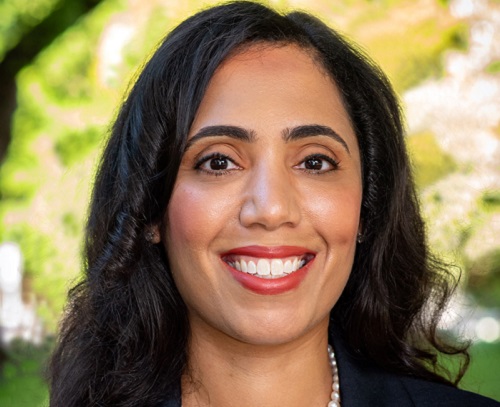
NCDOT’s Smith – who joined the agency in 2018 – has extensive experience in policy and program development, advocacy and economic development through service spanning over two decades. She holds both a master’s and bachelor’s degree in business administration and is a keen advocate of using equity policies to help bolster the transportation industry workforce.
Smith pointed out in testimony before the House of Representatives Committee on Transportation and Infrastructure in April 2022 that North Carolina is facing a workforce shortage as the average age of the state’s construction trade workers is approximately 50 years old.
“The impact of the expected labor shortage is amplified by the fact that many potential workers find construction trades unattractive and challenging to enter,” Smith noted. “Now more than ever, programs that target and prepare non-traditional populations and laborers are needed.”
That’s why greater investment in workforce development is necessary – especially in terms of attracting traditionally overlooked groups to take on those jobs.
“To achieve the best outcomes, we also recommend a review of Workforce Innovation and Opportunity Act in consideration of its reauthorization to determine if there are opportunities for amendments that are focused on funding for highway construction, and other transportation workforce and training programs,” Smith said.
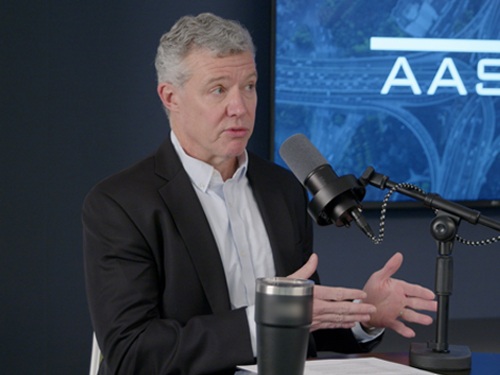 Nation
Nation
Transportation Matters with Jim Tymon, Winter Edition
February 20, 2026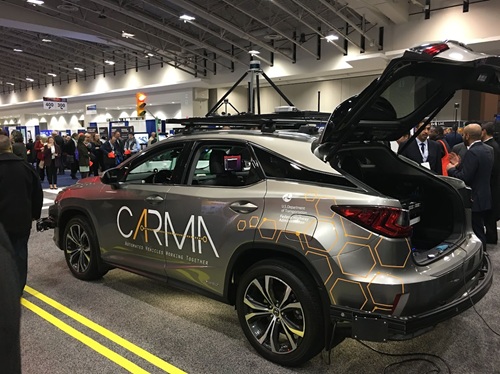 Nation
Nation
